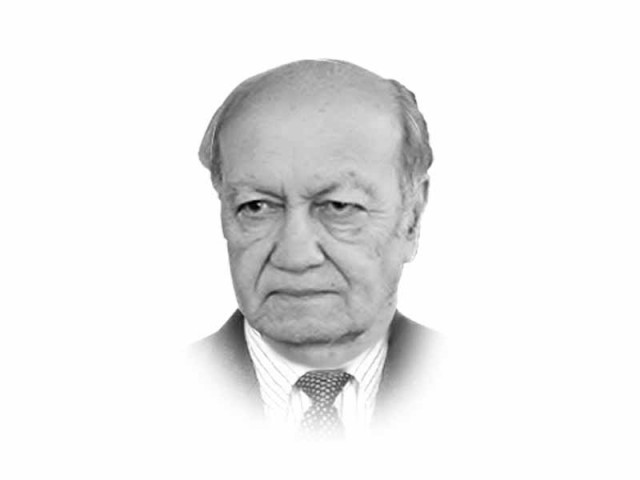Revitalising the Public Accounts Committee
One of the most powerful committees of parliament is the Public Accounts Committee

The writer is a retired lieutenant general of the Pakistan Army and a former federal secretary. He has also served as chairman of the Pakistan Ordnance Factories Board
The Ad Hoc Committee comprised 11 members with varied backgrounds. H U Beg, a highly respected and experienced retired bureaucrat, was its chairman. Other 10 members included reputed retired civil servants and members from the public and private sectors. I was the only one from the defence services.
As the previous parliaments and governments had not taken the assignment of reviewing the objections and audit paragraphs a huge backlog of cases was pending spreading over several years.
We succeeded in clearing a few years’ backlog but still there were hundreds of cases pending. Unfortunately, the situation today seems no better and it would take the new committee to work earnestly over the five-year term to bring it to date.
Choice of members on the Committee is the prerogative of the political parties and the representation of the opposition on it is based on their strength in parliament. Regrettably, in the past, political parties have not taken the Committee’s functioning seriously. They have used it to protect their failings rather than penalise corruption and loss of state revenues due to poor governance and negligence. A more effective use of the PAC would put all government institutions and departments on alert that any negligence or acts of corruption will not go unpunished. It is expected that experienced politicians with appropriate background having a good understanding of government functioning are members of the Committee. This would greatly contribute in making it effective and raise its prestige. The Committee proceedings should be open to the press that puts members on alert and under scrutiny.
The recent controversy as to who should head the Committee needs to be resolved soon. The earlier tradition that the leader of the Opposition is also the chairman of the PAC should continue. There is merit in this arrangement and it would strengthen the credibility of the Committee. A government party nominee as being suggested by the PTI spokesperson would break a good tradition and would convey an impression of vindictiveness. With tensions already high any departure from the current practice could lead to the PML-N withdrawing from the Committee altogether and rendering it ineffective. This is not to acknowledge that in the past there has been a tendency on the part of the chairman to be more relaxed and casual while examining audit paragraphs of their own political party. But with heightened awareness the chairman would have a problem overruling other members if he shows any leniency towards cases involving the previous government. It is one of the major challenges facing members of PAC that when they penalise or pass strictures on politicians, bureaucrats or businessmen for any misdeed a lot of pressure is brought on them. This indeed is a societal flaw and related to politics of patronage. It is our hope that politics sooner than later moves towards performance and members of PAC are able to withstand the pressures if their decisions are right. To achieve these goals suitability of individuals in nominating its members is a critical factor.
The Supreme and High Courts have their own internal accountability system. Although as experience over the years demonstrates that there is hardly any case where the Supreme Judicial Council has penalised any Supreme or High Court judge. The question then arises would the Supreme Court at some time in the future review its position in the light of its experience.
What are the practices in other countries, especially among Commonwealth countries that have similar judicial systems? These are questions that have been addressed by some of our eminent lawyers in the past, including Babar Sattar, and hopefully our honourable judges and eminent lawyers will revert to it in the future.
The military too has its own accountability system. There are cases when senior officers have faced charges of corruption and mismanagement and were penalised by military courts. Here too we need to study models of other Commonwealth countries with parliamentary systems and how their military conducts its accountability.
If we examine most of PAC deliberations one aspect emerges clearly. There has to be one priority and it should be good governance. This would act as a huge incentive for attracting foreign investment, which is necessary for developing and expanding our industrial and agricultural base and physical infrastructure. The success of CPEC and expected investments from Saudi Arabia and other friendly countries would largely depend on how Pakistan succeeds in building an effective system of accountability free of corruption. To achieve this objective the government should earnestly strive towards improving the rule of law and promoting accountability at all levels. The recent incident where a grade 20 officer was caught stealing the purse of a visiting Kuwaiti minister betrays the deep malaise that has permeated our society. It has shamed the nation and would require extraordinary effort to filter out corrupt elements to achieve the goals of good governance, transparency and accountability.
Experience of other countries, including ours, shows having elaborate laws and anticorruption institutions such as the PAC, National Accountability Bureau and other agencies are necessary but not enough. To curb corruption, politicians, bureaucrats and heads of principal state institutions and public-sector enterprises will have to lead through self-example. One sincerely hopes that transformation would soon begin.
Published in The Express Tribune, October 3rd, 2018.
Like Opinion & Editorial on Facebook, follow @ETOpEd on Twitter to receive all updates on all our daily pieces.














COMMENTS
Comments are moderated and generally will be posted if they are on-topic and not abusive.
For more information, please see our Comments FAQ